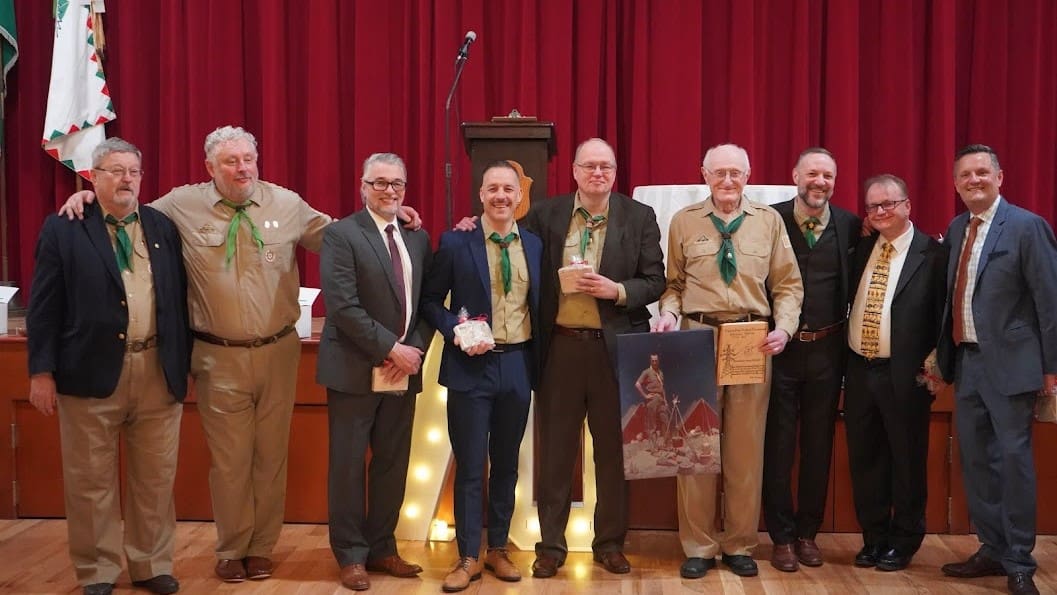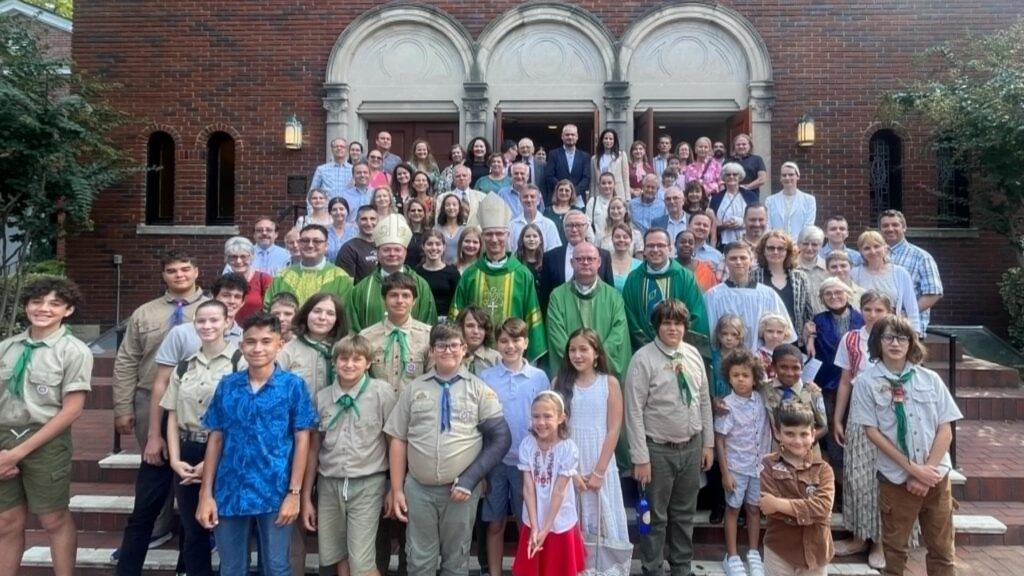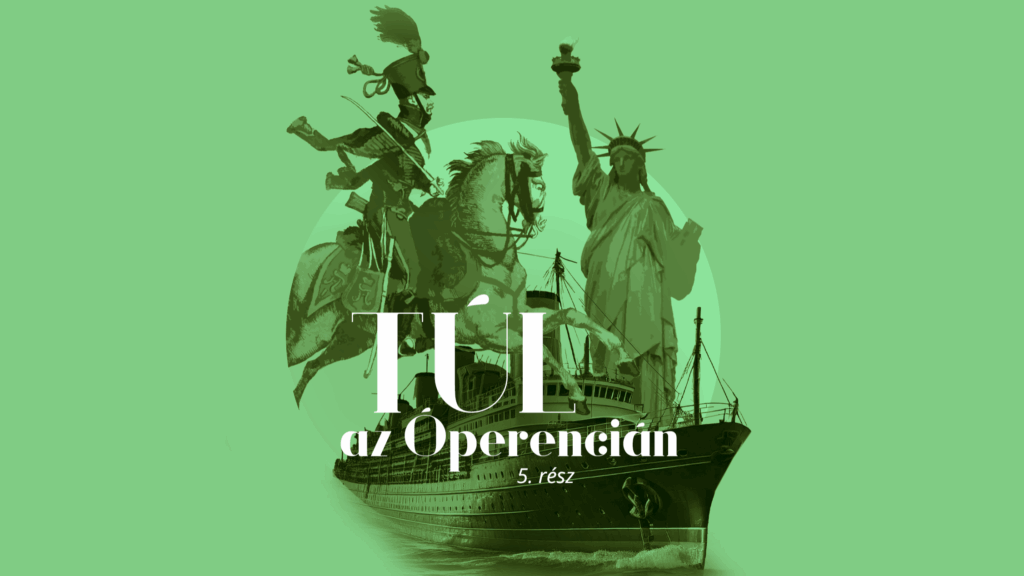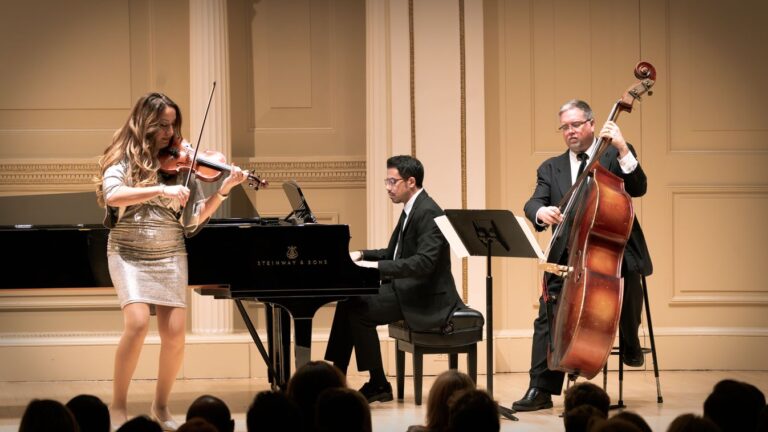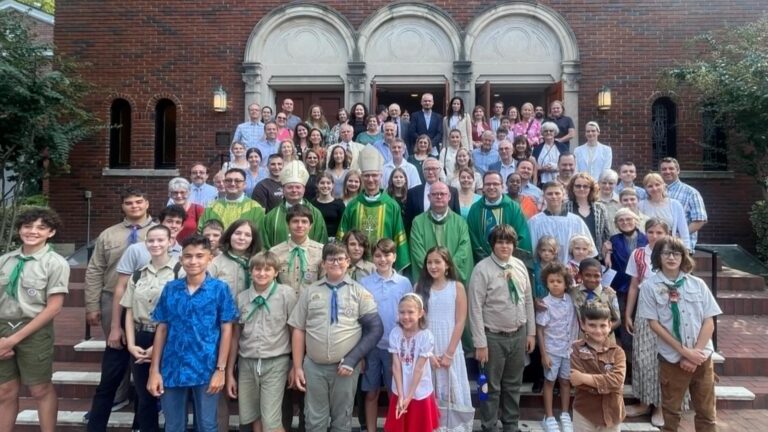A grand celebration was held at the Hungarian American Athletic Club (HAAC) in New Brunswick to mark the 70th anniversary of founding the Bornemissza Gergely Boy Scout Troop no. 5 of New Brunswick. After the entry of the boys’ troop István Bereczki, current troop commander, welcomed the guests, among them Imre Lendvai-Lintner, president of the Hungarian Scouts Association in Exteris (KMCSSZ in Hungarian), and delivered a speech. Subsequent to the introduction of all of the former local troop leaders István Vajtay Jr, vice president of the KMCSSZ, welcomed the guest of honour of the evening, Miklós Schlóder, the oldest former troop leader, and proclaimed him the Honorary Lifetime Commander of the troop.
According to the official Troop Chronicle, Boy Scout Troop no. 5 named ‘Stateless Eagles’ was formed on 1 August, 1947 in Barnau, Austria. However, it was disbanded in 1950 due to the post-war mass immigration of most of its members. In August 1951, former troop member József Szőke held a recruitment meeting in the old HAAC building in New Brunswick, where the key speaker was troop leader Gábor Bodnár, a founding member of the Hungarian Scout Association (MCSSZ in Hungarian). Subsequently, under the leadership of József Szőke, the Széchenyi István ‘mixed’ Scout Troop no. 18 was formed in Woodbridge in 1951, with boys and girls from New Brunswick also joining. In 1953, a separate boys troop named Gergely Bornemissza was also founded under number 5, led by Alfonz Mindel, and in 1958, a separate girls troop was also established, led by Judit Olcsváry, named Zsuzsanna Lorántffy and under number 41.
After six years of operation, Hungarian scouting in Woodbridge ceased. The boys’ troop, retaining its name and number, moved to New Brunswick in 1959, where Tamás Tamás became their commander. In 1962 Father Vazul Végvári took over both troops, while Miklós Schlóder (called ‘Mikibá’ by the scouts) led the boys for 14 years, from 1967 to 1981, when he handed leadership over to Tamás Vajtay, the troop’s first New Brunswick-born leader. Since then, the troop has been led and managed mostly by boys, now men, who were born in America and grew up as troop members. The sons of well-known local Hungarian families (Vajtay, Kerekes, Hajdú-Németh, Varga, Tamás, and Bereczki) have taken over the team one after the other; their sacrifice has ensured its survival. Their work has been supported by an enthusiastic support body, the Circle of the New Brunswick Scout Parents. The New Brunswick scouts are active members of the New York District of the KMCSSZ, where they regularly participate in Kodály Weekends (themed around Hungarian folk traditions), recitation and sports competitions as well as other activities. Their members are regularly enrolled in KMCSSZ leadership training camps, ensuring the future of the troop.
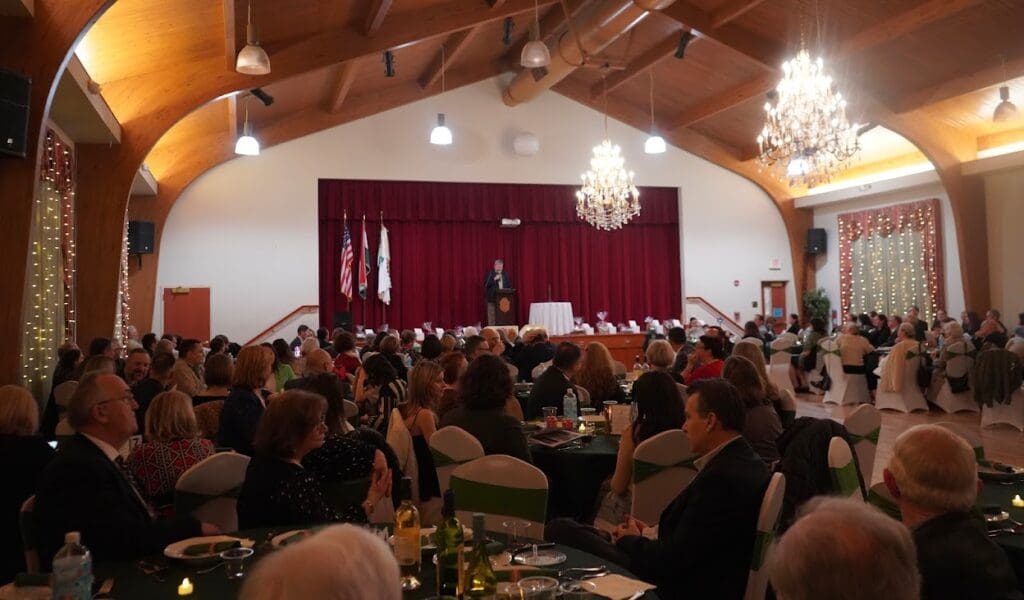
In his welcoming speech, current troop commander István Bereczki pointed out: none of the founders could have imagined that 70 years later a troop consisting of about 50 members would still be operating in New Brunswick. He warmly welcomed the older scouts, ‘who have a home in this community because they built it together and have always belonged here’. Imre Lendvai-Lintner, current president of the KMCSSZ, conveyed the greetings, appreciation, and thanks of the association’s leadership. As he noted, 70-year anniversaries are rare in human life; many organizations do not mature until this age either. Lendvai stressed that it is also a call to action: ‘It is an achievement that demands an accounting, assessment and evaluation, as it represents a rare high ground’. He recalled that scouting is now the world’s largest civic organization after the UN, with more than 40 million members. Within this group, there are more than 20,000 Hungarian scouts, while KMCSSZ has almost 3,000 members; thus, the New Brunswick troop, with its approximately 50 members, is part of this large scouting family.
The president continued his speech by thanking the parents, some of whom are now grandparents, who ‘for 70 years have recognized the value that Hungarian scouting can give to their children, and have been willing to bring their children to the sessions week after week to provide moral and financial support and last but not least, to go to work: to bake, to cook, to clean, i.e., to serve’. He then thanked the leaders; not only the commanders, but also the young officers, assistant officers, and patrol leaders who, week after week, conscientiously prepared and worked with the scouts without any financial reward. Finally, Lendvai thanked the local Hungarian community for supporting the troop morally and financially for many years: the Catholic and the Reformed churches, the HAAC, and other local organizations and individuals.
‘The 70 years lead us to the conviction that those who have been struck by the Scout Spirit are not concerned with life or death;
they live and stand, sing and create, in the Carpathian Basin and in Hungary, in New Brunswick and in other countries, in seven continents, and even in the Other World!’
Then István Bereczki took the stage again, calling out all the former local troop leaders one by one, and referring to the wooden headboards (‘kopjafák’ in Hungarian) erected at the Sándor Sík Scout Park in Fillmore (upstate New York) pointed out: ‘The wooden headboards are not historical characters from long ago, but are now our friends, which is both an uplifting and sad feeling’. To properly commemorate the first local team commander Tamás Tamás, a young assistant officer Buda Kun-Szabó, prepared a small wooden headboard, which he presented at the celebration. Berenczki continued saying how gratifying it would be if such recognitions were to happen during a person’s lifetime. He recalled the last birthday of KMCSSZ founder Gábor Bodnár, which everyone knew would be his last due to his serious illness, making it even harder to give him any proper presents. They concluded that the only valuable gift they could give was recognition, and prepared a small sculpture depicting a man of steel, about which the engineer Miklós Schlóder remarked: ‘Guys, a man of steel made of copper?!’ Then he added: ‘Anyway, it was a great thing to do.’
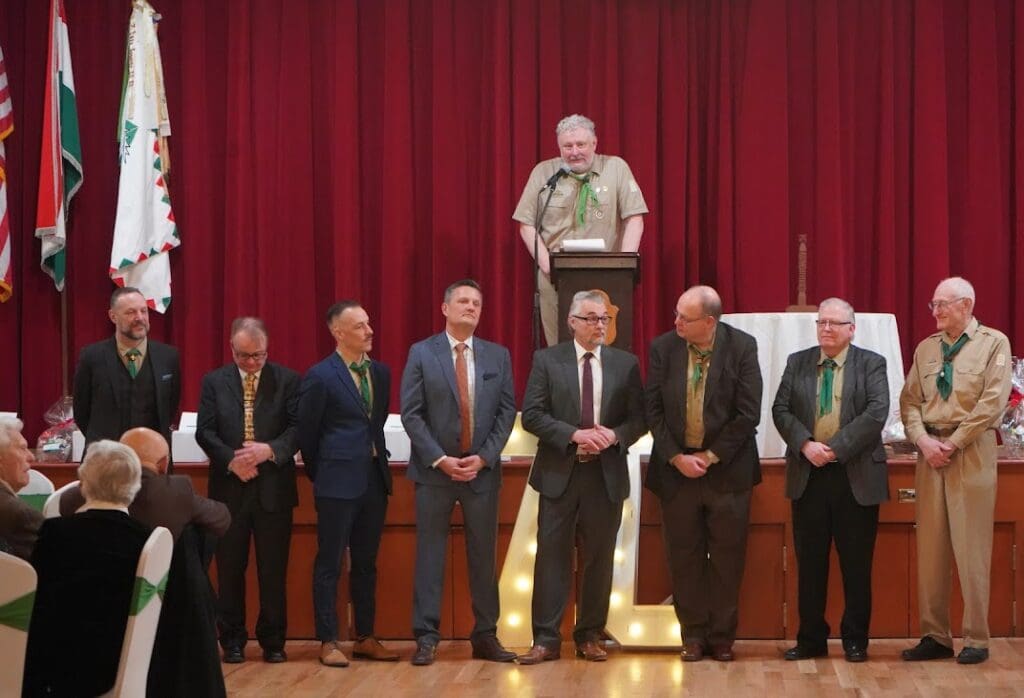
Subsequently, Bereczki stated that since Mikibá is still with them, they would like to salute him, the scout leader who became a scout four years before the foundation of the local troop in 1950 in Germany. ‘Mikibá, we respect you and we love you very much’, concluded the current commander, and handed the stage over to István Vajtay Jr, vice president of KMCSSZ. Vajtay recalled that at the end of his second term as the leader of the troop, he received a very nice gift, a reproduction of a painting by Norman Rockwell, who was also the official illustrator of the Boy Scouts of America. The painting titled ‘The Commander’ depicts a scout camp after curfew with the boys sleeping in tents in the background, and with a lone figure standing guard by the dying fire, protecting the peace of the camp, watching over the sleeping boys. Vajtay said he was very grateful for the painting, but immediately realised that the ‘tall, thin, thinning-haired but not yet bald figure, still wearing his youth scout trousers’ could not be him, but rather Mikibá, who had been the troop commander from his early scouting days until the end of his university years, for 14 years in total. ‘We suspected that Mikibá probably had a job where he might have earned some money, but it seemed to us that he was always just scouting. He was a bachelor then, and when he was not leading weekly troop meetings, he was planning raids, trips, and camps, sorting out the troop’s equipment, fixing the wounds in the Scout House after forbidden indoor soccer games, pumping the basement of the often leaky house or preparing for parties, harvest balls, Dot Balls, Mothers’ Day lunches, movie nights, and New Year’s Eve parties. Mikibá was simply always there, always scouting.’
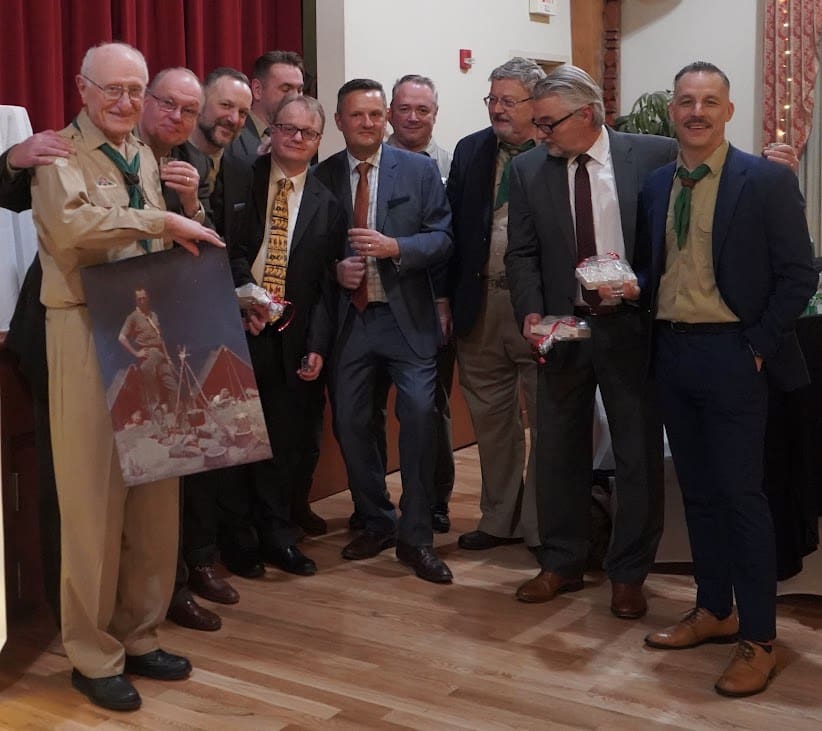
But that’s not all he did. The vice-president pointed out that he had known Mikibá for at least 60 years and had never heard him speaking in a rude manner, telling indecent jokes or even the most innocent lie; he has never uttered a gossip, a bad word, a derogatory opinion of anybody; he has never been impatient with even the most imprudent scout, nor shouted at the most impertinent boy. ‘Others wear their command like a millstone,
but Mikibá always radiated nothing but the genuine joy of scouting.
When there were Hungarian flatbreads (‘lángos’ in Hungarian) to fry in the July heat, scones to bake and pans to lift before the holidays, lodgings to provide for scouts from far away, a scout bus full of noisy youngsters to drive to Fillmore, wet tents to spread and dry after camps, Mikibá was the first and often the only one there, cheerfully doing what needed to be done.’ Vajtay recalled that uprightness, cleanliness, helpfulness, frugality, being ‘gentle with others, strict with oneself’ are all part of the Scout Law and pledge. As he emphasised, everyone in the room had once pledged to ‘serve God, country, fellow human beings and the Hungarians’; but some had never taken it seriously, for them it was just ‘words spoken in a hurry at an evening ceremony for children’. There are some for whom it meant something for a while, but then the difficulties of adulthood, work and family, the burdens of grey everyday life arrived, ‘and the pledge was scraped away to the attic, with the outgrown scout’s uniforms’. But some have taken them to their hearts–perhaps because ‘their own character was already parallel to the Scout spirit, so it was natural for them to live according to those laws and pledges. In Rockwell’s painting, Mikibá seems to resemble the commander, but the truth is that all good commanders resemble Mikibá, so tonight, on the occasion of the 70th anniversary of founding Scout Troop Bornemissza Gergely no. 5, we proclaim Miklós Schlóder, our beloved Mikibá, as our Honorary Lifetime Commander.’
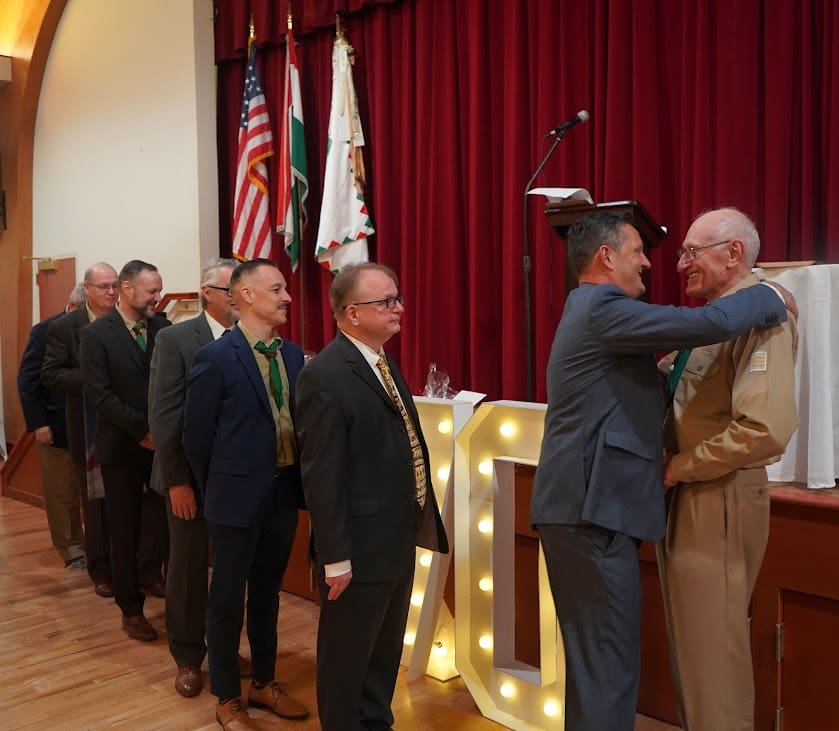
Then István Bereczki recited Sándor Sík’s poem ‘The Man of Steel’, dedicating it to all his predecessors. The celebrated Mikibá thanked the gifts briefly with his usual modesty, and added with his well-known humour: ‘it is not good to talk after a lawyer, nor to argue with one’ (as Vajtay is a lawyer). Then recalled that in 1950 the scout association organised the first big scout camp in Bavaria, Germany, which was attended by another person present besides himself. He did not reveal the name of who that person, but the audience recognised her and greeted Eva Kazella with a big round of applause.
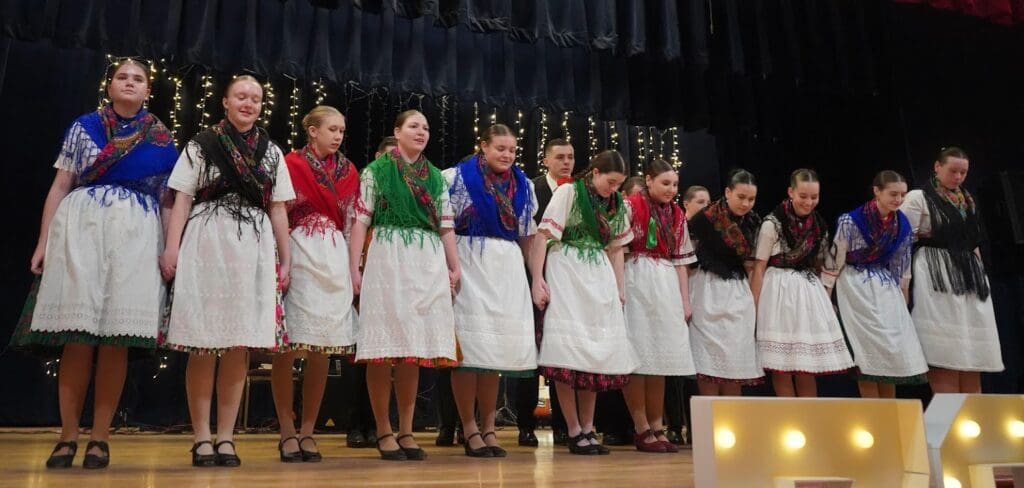
After the speeches, which were often interrupted by applause and cheerful laughter, the local Regös (scout folk dance) group performed folk dances from the Gömör region, and the local Fészer Banda and Horváth Duo took turns to play music until dawn. I was wondering how lucky my Hungarian scout children are to be able to get to know personally some of the legendary figures of KMCSSZ, thanks to whom Hungarian scouting still exists around the world. I would like to express my thanks and gratitude to the founders, to all those who took their laws and pledges seriously, and of course to all those who helped and supported them. As the Team Chronicle puts it: ‘The seedling planted by the leaders of Team 18 in 1951 has since grown into a big tree. Divine providence and human sacrifice have been at the heart of everything that has led the Gergely Bornemissza troop no. 5 to the milestone of 70 years of existence.’ God bless not only this troop but all Hungarian scouts all over the world, and not only the local Hungarian communities, but all of them throughout the diaspora and the Carpathian Basin.

